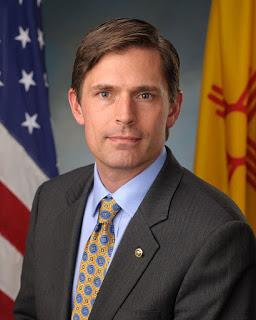 Regular readers of this blog will know that I support the Iran Agreement. It may not be perfect, but I see no alternative to it short of starting a new war. And I find it shocking that so many politicians (most Republicans and some Democrats) are saying they will vote against the agreement. I believe they are just playing politics at the expense of what is good for this country (and the world).
Regular readers of this blog will know that I support the Iran Agreement. It may not be perfect, but I see no alternative to it short of starting a new war. And I find it shocking that so many politicians (most Republicans and some Democrats) are saying they will vote against the agreement. I believe they are just playing politics at the expense of what is good for this country (and the world).Fortunately, not all politicians are doing this. Some are willing to buck the trend of their congressional comrades, and do the right thing. One of these politicians is Senator Martin Heinrich (D-New Mexico). And he explains his position very well. Posted below is an op-ed Senator Heinrich (pictured) wrote for the Albuquerque Journal:
In the first decade of this century when we were entangled in the War in Iraq, Iran’s nuclear program surged ahead rapidly, adding thousands of centrifuges, building complex nuclear facilities and stockpiling highly enriched uranium. In the absence of real negotiations and before the most recent sanctions, Iran built a nuclear infrastructure that went from 164 centrifuges in 2003 to 19,000 centrifuges today and included large quantities of 20 percent enriched uranium that could quickly be enriched to weapons grade material. When evaluating the deal we achieved with our allies and partners to prevent Iran from being able to build a nuclear weapon, context, data and details like these matter. Perhaps the most critical data point: Without a deal, Iran could acquire enough highly enriched material for a bomb in 60-90 days. With a deal, Iran must reduce its stockpile by 98 percent. It must cut its number of centrifuges by two-thirds. And it must allow 24/7 inspections and continuous monitoring of its nuclear infrastructure. Further, a mechanism is in place that will allow inspections of sites should we suspect covert action being taken to build a bomb anywhere else in Iran. This accord breaks each path to a weaponized nuclear device, including any potential covert effort. We should welcome each of those developments as major steps toward regional and international security. I have studied both the science and the politics of the nuclear-age world we live in from an early age. I grew up listening to my father, who served in the Navy in the ’50s, tell what it was like to watch a nuclear blast firsthand and to see the formation of a mushroom cloud over Enewetak Atoll in the Marshall Islands. While studying engineering at the University of Missouri, I worked at one of the largest research reactors in the United States. More recently, I have seen the centrifuges dedicated to the peaceful production of nuclear energy, which are housed in New Mexico. In the House and now on the Senate Armed Services Committee, I have served on the Strategic Forces Subcommittee, which sets policy on non-proliferation and our nuclear deterrent. I also serve on the Senate Select Committee on Intelligence, where I have received numerous briefings on Iran’s nuclear program and capabilities. So I am well acquainted with the steps necessary to successfully construct a nuclear weapon and to detect such activity. The comprehensive, long-term deal achieved last week includes all the necessary tools to break each potential Iranian pathway to a nuclear bomb. Further, it incorporates enough lead time so that, should Iran change its course, the United States and the world can react well before a device could be built; a scenario I hope never occurs, but one that leaves all options on the table, including the military option. Many of my colleagues in the Senate will object to this historical accomplishment, saying that we could have done better. However, they fail to offer any realistic alternatives. The only concrete alternative, should Congress reject this deal, comes from my colleague, Sen. Tom Cotton of Arkansas, who has suggested a military strike. While the military option will always remain on the table, it should remain our absolute last resort. Our military and intelligence leaders have looked at the potential repercussions should a military conflict with Iran occur. That path would provoke retaliation and very likely lead to a nuclear armed Iran in a matter of just a few years. For too long, our country has been engaged in military conflicts that have cost our nation dearly in blood and treasure. We must always be ready at a moment’s notice to defend our country, our allies and our interests, but we must also be willing to avoid conflict whenever a diplomatic option is present and possible. I am optimistic this accord is in the best interest of our nation and our allies. I am still deeply distrustful of Iran’s leadership. But, to make peace, you must negotiate with your enemies. Any deal with Iran will not be without risk, but the risks associated with inaction are far more dire. This deal sets the stage for a safer and more stable Middle East, and a more secure United States. We must seize this historic opportunity.

